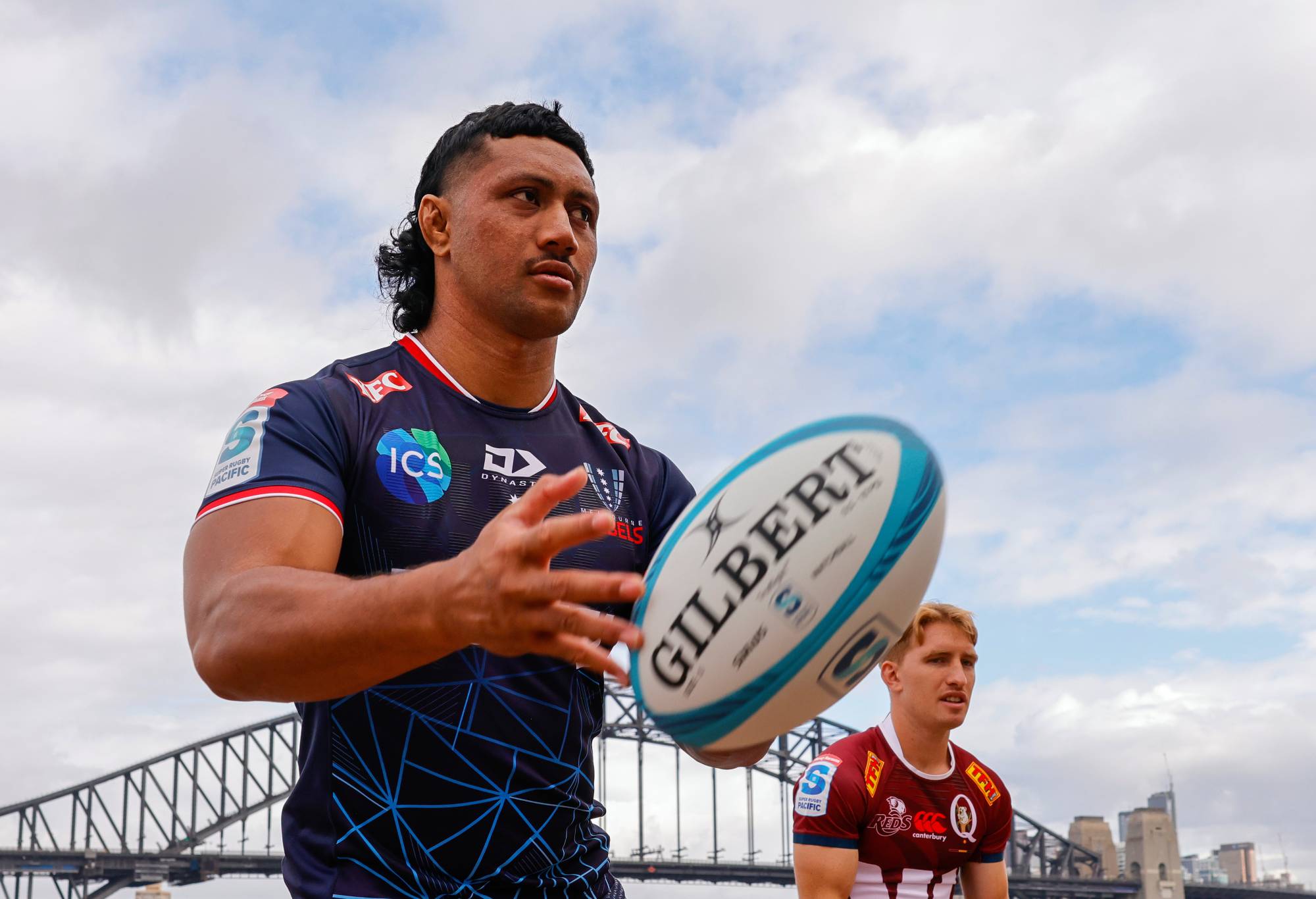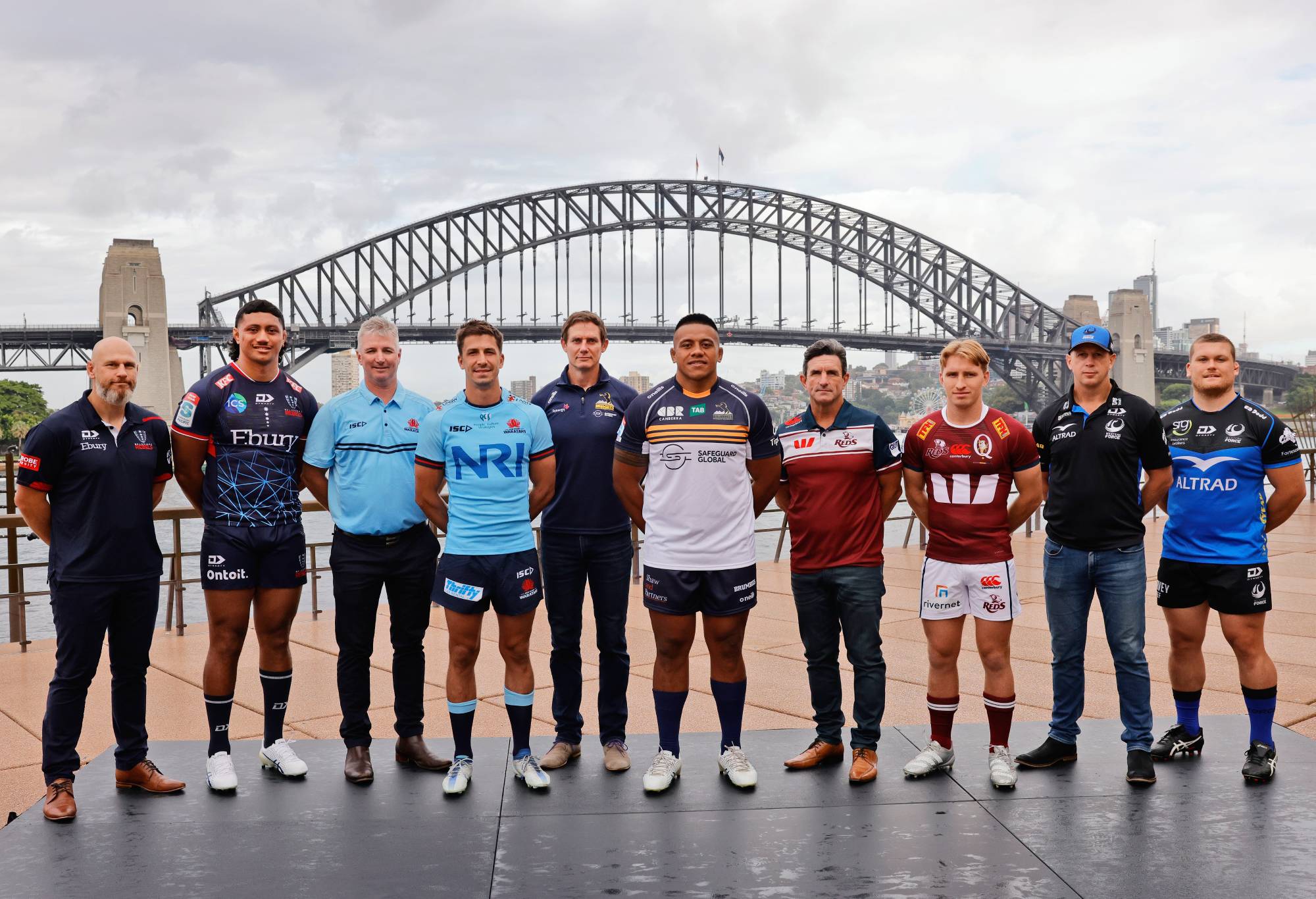As the Melbourne Rebels entered voluntary administration, homegrown captain Rob Leota says he hopes the rocky road his club is experiencing pulls the side closer together and galvanises them for the 2024 Super Rugby season.
It comes as former Wallabies coach Eddie Jones said the franchise’s troubles were another indication that “hard decisions” needed to be made to help turn Australian rugby around.
After the best part of two months of negative headlines surrounding the future of the Rebels, the Super Rugby side officially slumped into voluntary administration on Monday night.
With an estimated $10 million worth of debts, and a cash-strapped national union looking for ways to dig themselves out of a financial and high-performance mess, the future remains unclear beyond 2024 with Rugby Australia giving no assurances the franchise will exist beyond this season.

Rob Leota says he wants the Rebels to make a statement for rugby in Victoria. (Photo by Jenny Evans/Getty Images)
The gloomy picture comes as the Rebels look to give the competition the biggest shake yet since coming into existence in 2011, with general manager Nick Stiles assembling one of the franchise’s strongest rosters yet.
Indeed, the arrival of Wallabies Taniela Tupou and Lukhan Salakaia-Loto have injected some proven muscle and power up front, while fellow internationals Jack Maunder and Matt Proctor have brought some more experience and depth to slot in between Test backs Carter Gordon and Andrew Kellaway.
Leota, who started in the Rebels’ pathways as a 14-year-old and is the franchise’s first homegrown captain, said he hoped their actions on the field would go some way in showing that rugby has a home in Melbourne.
“I think it just gives us more of a purpose to go out this year and really make our fans and our state and, obviously, all of Melbourne proud,” Leota told The Sydney Morning Herald.
“Once we start round one, we want to show that rugby is not dead in Melbourne, and the best way to do that is to play good rugby.
“I think the people that came before us who are lot older now in Victoria didn’t have the opportunity to have that pathway [at the Rebels] that we’re living in right now.
“A lot of the Victorian [rugby] community are very passionate and understands that, and obviously that’s why they want us to win. I think it’s just given us a greater purpose.”

Eddie Jones says some “hard decisions” need to be made in Australian rugby. (Photo by Jenny Evans/Getty Images)
Leota is one of 11 Wallabies in the Rebels’ squad, while several members of the side have come through the Melbourne pathways like Jordan Uelese.
The powerful back-rower said he hoped he could be an example for aspiring boys and girls to follow their rugby dream.
“For younger kids in Melbourne, being able to look and see one of their own captaining the Rebels, then they can see themselves when they see me and they know you can dream as big as you want,” Leota said.
“I don’t take that lightly because it’s very proud for me to see younger Victorians coming through the pathways, and there are guys of 19 and 20 that are coming through now who are just like me when I came in.
“It’s awesome to be able to see younger players keep coming through, there are even guys that are starting rugby now that are six, seven and eight years old [in Victoria] that are going to continue playing.”
Rugby Australia’s financial struggles were one of the reasons why Jones pushed the eject button last year following the Wallabies’ World Cup disaster.
Jones was assured RA would not only be moving to a centralised system but that he would also have more financial resources available to him, as they governing body attempted to secure a private equity deal around $200m. Neither occurred.
Asked to set the record straight on his decision to walk away from the Wallabies and join Japan, Jones said RA was well aware of his position throughout the year he was back in Australian rugby and pointed at the Rebels’ struggles as an example of the pressures the game was experiencing.
“I think I’ve covered all of that, mate,” Jones told the UK Telegraph rugby podcast.
“I don’t look back at it with any feeling that I’ve been anything but upfront with Australia. Australia knew what was going on.
“I never had any intention to leave Australia but when Australia wasn’t able to fulfil their obligations, and we’ve seen today I think the Rebels have gone bankrupt.
“It’s a tough time for Australia but to progress from where they are they need to get things together and that means they’ve got to make some hard decisions and they’ve got to develop their players differently.”
Australian rugby fans will get a unique insight into what life was like under Jones when Stan’s documentary on the Wallabies is aired on February 22.
Jones said he wasn’t interested in what came out of the three-part documentary.
“I’ve got no idea and don’t really care,” he said. “That’s all history now.”
Asked whether he would watch it, Jones said “Probably not.”
“I’ve moved on, mate,” he said.
“One of the things you’ve got to do in rugby, and any role you’ve got whether it be a coach or a player, is if you keep on looking back over your shoulder and keep wanting to either go back or escape from what it was, it doesn’t treat you at all well in what you’re doing now, so I’ve just got to move on.
“I had my time with Australia, I had a go. There were reasons for it not working out like it did, but I take full responsibility and move on, but I don’t want to look back now.”






























































































